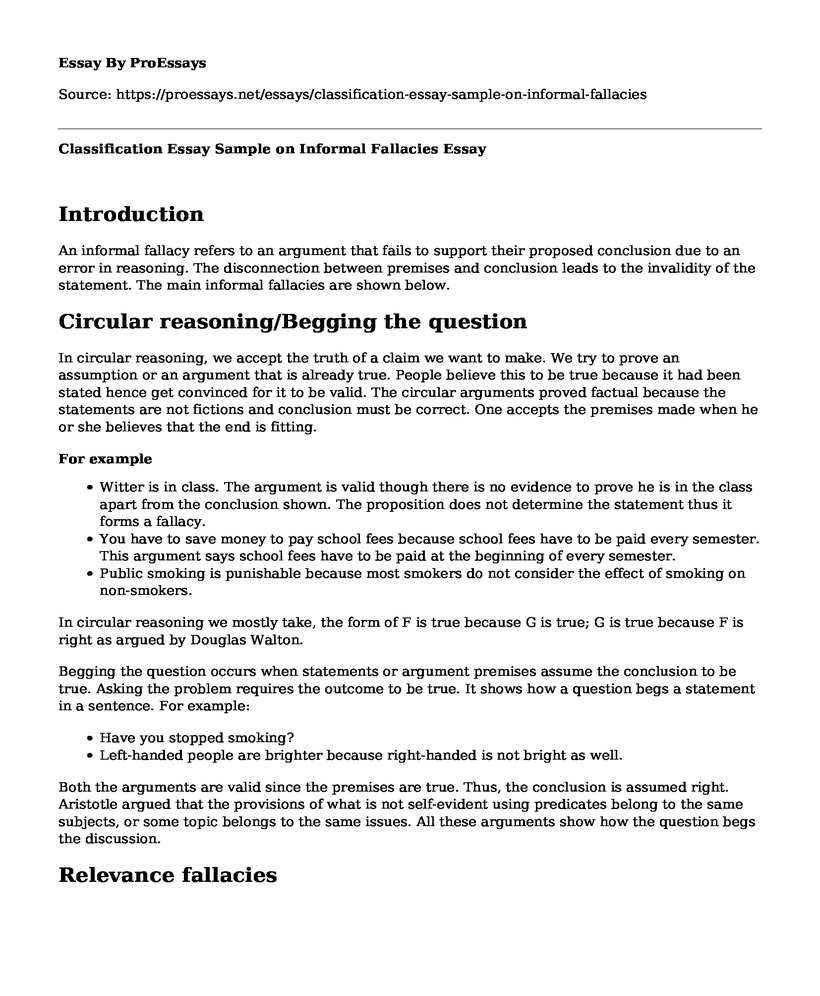Introduction
An informal fallacy refers to an argument that fails to support their proposed conclusion due to an error in reasoning. The disconnection between premises and conclusion leads to the invalidity of the statement. The main informal fallacies are shown below.
Circular reasoning/Begging the question
In circular reasoning, we accept the truth of a claim we want to make. We try to prove an assumption or an argument that is already true. People believe this to be true because it had been stated hence get convinced for it to be valid. The circular arguments proved factual because the statements are not fictions and conclusion must be correct. One accepts the premises made when he or she believes that the end is fitting.
For example- Witter is in class. The argument is valid though there is no evidence to prove he is in the class apart from the conclusion shown. The proposition does not determine the statement thus it forms a fallacy.
- You have to save money to pay school fees because school fees have to be paid every semester. This argument says school fees have to be paid at the beginning of every semester.
- Public smoking is punishable because most smokers do not consider the effect of smoking on non-smokers.
In circular reasoning we mostly take, the form of F is true because G is true; G is true because F is right as argued by Douglas Walton.
Begging the question occurs when statements or argument premises assume the conclusion to be true. Asking the problem requires the outcome to be true. It shows how a question begs a statement in a sentence. For example:
- Have you stopped smoking?
- Left-handed people are brighter because right-handed is not bright as well.
Both the arguments are valid since the premises are true. Thus, the conclusion is assumed right. Aristotle argued that the provisions of what is not self-evident using predicates belong to the same subjects, or some topic belongs to the same issues. All these arguments show how the question begs the discussion.
Relevance fallacies
Appeal to Authority
Is an argument believed to be true because someone supposed to be an authority or an expert said the subject? Instead of providing evidence to support the case it only relies on the legitimacy of the body or the expert. For example
I am the best athlete, so you should believe that drinking water every morning before you take any food is healthy. The statement can be relied on since the best athlete mentioned it without evidence of how credible it is.
Genetic Fallacy
Judging something right because of where it originates. The misconception is based on; origin, history or the source where it emerges from rather than judging it from the current context or meaning. Even if the source of the statement is not reliable, we trust it to be true without proof of the real significance of the background. For example
''You are not going to wear an ankle ring because it was believed that only married women wore it.'' The fallacy does not provide evidence for its merit as a result; it must give the direction to reality or truth.
Appeal to Emotions
This manipulation of the recipient emotions to win an argument without any fact based on the evidence. It depends on manipulation of emotions to respond instead of providing a valid argument. Instead of delivering points, one argues persuasively to have a foundation to appeal a case. At such the validity of the evidence is not established, as it does not have to prove. For example,
''I will cut the cost of spending, this will have a negative economic effect on the cost of living to mothers.'' The argument shows how a politician can emotionally pledge without the evidence of how he is going to do it.
Argument to Novelty/Tradition
The argument of a position to be true because it is new or old. This fallacy argues that an idea is true because it is new or old without mature claims of how true it is. The fallacy prematurely accepts an argument to be true without investigating how best it is or worse it may be. Appeal to novelty is considered successful because of the modern world where everyone is eager to be. It depends on the reasoning of people, as they tend to improve their efforts for future flaws. For example:
This statement shows how one can trust the idea without comprehending the facts in it.
References
Davies, Arthur Ernest. A textbook of Logic R.G. Adams and company, 195
Gibson, William Ralph Boyce and Augusta Klein. The problem of Logic A and C Black, 1908.
Kelley, D. The art of Reasoning WW Norton $ Company Inc., 1994
Cite this page
Classification Essay Sample on Informal Fallacies. (2022, Oct 21). Retrieved from https://proessays.net/essays/classification-essay-sample-on-informal-fallacies
If you are the original author of this essay and no longer wish to have it published on the ProEssays website, please click below to request its removal:
- A Discussion on Network Neutrality Paper Example
- Paper Example on Benefits of Personal Injury Attorneys to the Society
- The New Negro Movement Essay Example
- Essay on Groups, Heroes, Sages, and Enemies: Interpersonal Communication in HRM
- Community Safety Plan of Action: Requirements and Recommendations - Essay Sample
- Essay Sample on Living in an Abusive Marriage: The 'Sweat' Story by Zora Neal Hurston
- Research Paper Example on Photography: A Powerful Tool for Communicating the Truth







